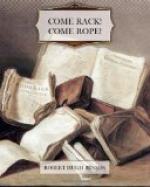II
It would be an hour later that they bid good-bye to Mr. Thomas FitzHerbert, high among the hills to the east of the Derwent river; and when they had seen him ride off towards Wingerworth, rode yet a few furlongs together to speak of what had been said.
“He can do nothing, then,” said Robin; “not even to give good counsel.”
“I have never heard him speak so before,” cried Anthony; “he must be near mad, I think. It must be his marriage, I suppose.”
“He is full of his own troubles; that is plain enough, without seeking others. Well, I must bear mine as best I can.”
They were just parting—Anthony to ride back to Dethick, and Robin over the moors to Matstead, when over a rise in the ground they saw the heads of three horsemen approaching. It was a wild country that they were in; there were no houses in sight; and in such circumstances it was but prudent to remain together until the character of the travellers should be plain; so the two, after a word, rode gently forward, hearing the voices of the three talking to one another, in the still air, though without catching a word. For, as they came nearer the voices ceased, as if the talkers feared to be overheard.
They were well mounted, these three, on horses known as Scottish nags, square-built, sturdy beasts, that could cover forty miles in the day. They were splashed, too, not the horses only, but the riders, also, as if they had ridden far, through streams or boggy ground. The men were dressed soberly and well, like poor gentlemen or prosperous yeomen; all three were bearded, and all carried arms as could be seen from the flash of the sun on their hilts. It was plain, too, that they were not rogues or cutters, since each carried his valise on his saddle, as well as from their appearance. Our gentlemen, then, after passing them with a salute and a good-day, were once more about to say good-bye one to the other, and appoint a time and place to meet again for the hunting of which Robin had spoken to Marjorie, and, indeed, had drawn rein—when one of the three strangers was seen to turn his horse and come riding back after them, while his friends waited.
The two lads wheeled about to meet him, as was but prudent; but while he was yet twenty yards away he lifted his hat. He seemed about thirty years old; he had a pleasant, ruddy face.
“Mr. Babington, I think, sir,” he said.
“That is my name,” said Anthony.
“I have heard mass in your house, sir,” said the stranger. “My name is Garlick.”
“Why, yes, sir, I remember—from Tideswell. How do you do, Mr. Garlick? This is Mr. Audrey, of Matstead.”
They saluted one another gravely.
“Mr. Audrey is a Catholic, too, I think?”
Robin answered that he was.
“Then I have news for you, gentlemen. A priest, Mr. Simpson, is with us; and will say mass at Tansley next Sunday. You would like to speak with his reverence?”




